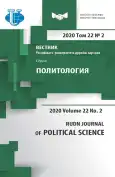The Perspectives of Russia’s Soft Power in the Western Balkans Region
- 作者: Djokic A.1
-
隶属关系:
- Peoples’ Friendship University of Russia (RUDN University)
- 期: 卷 22, 编号 2 (2020)
- 页面: 231-244
- 栏目: SOFT POWER AND RUSSIA’S IMAGE
- URL: https://journal-vniispk.ru/2313-1438/article/view/322159
- DOI: https://doi.org/10.22363/2313-1438-2020-22-2-231-244
- ID: 322159
如何引用文章
全文:
详细
关键词
作者简介
Aleksandar Djokic
Peoples’ Friendship University of Russia (RUDN University)
Email: dzhokich_a@pfur.ru
Master of Arts in Political Sciences, Lecturer Assistant of the Department of Comparative Politics 6 Miklukho-Maklaya St, Moscow, 117198, Russian Federation
参考
- Nye J.S. Soft Power - The Means to Success in Worlds Politics. New York: Public Affairs. 2004: 191.
- Bially Mattern, J. The Concept of Power and the (Un)discipline of International Relations. The Oxford Handbook of International Relations. 2008: 691-698. doi: 10.1093/oxfordhb/9780199219322.003.0040
- Kratochwil F., The Monologue of “Science”. International Studies Review. 2003; 5: 124-128. doi: 10.1111/1521-9488.501019_2
- Campbell D. Why fight: humanitarianism, principles, and post-structuralism. Millennium: Journal of International Studies, 1998; 27: 497-521. doi: 10.1177/03058298980270031001
- Wight M. Power Politics. London: The Royal Institute of International Affairs. 2004: 316.
- Bechev D. Russia’s Strategic Interests and Tools of Influence in the Western Balkans. NATO Strategic Communications Centre of Excellence. 2019: 34.
- Kovic M. Disraeli and the Eastern Question. Belgrade: Clio. 2018: 509 (In Serbian).
补充文件









